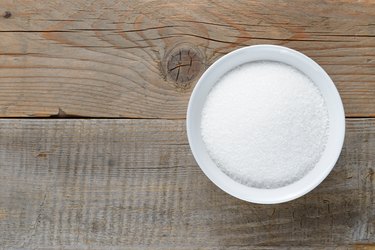
Most cookie and cake recipes require a lot of sugar or honey, which can easily derail your diet. The calories in a tablespoon of sugar may seem negligible, but can they add up over time and cause you to pack on pounds. Luckily, there are healthier substitutes for this popular ingredient.
Tip
One tablespoon of sugar has about 48 calories and equals 3 teaspoons. A 20-ounce bottle of cola provides 65 grams of sugar and 260 calories from this ingredient alone.
Video of the Day
Sugar Calories and Nutritional Value
Added sugar is hidden in thousands of foods and beverages, from desserts to salad dressings and pizza. Brown sugar, cane sugar, honey, molasses, rice syrup, dextrose and fructose are nothing but sugar in disguise. This sneaky ingredient leaves you craving for more and adds empty calories to your meals.
Video of the Day
Your body doesn't need sugar to function properly, points out the American Heart Association. Unlike protein, complex carbs and fats, sugar has no nutritional value. It does boost your energy for a short time, but that's because it raises glucose levels. Unfortunately, its energizing effect is followed by crashes.
Read more: 15 Reasons to Kick Sugar
Whether you prefer coconut sugar, brown sugar or powdered sugar, the calories in a tablespoon of sugar are the same for all varieties. This food ingredient delivers 4 calories per gram, according to the American Heart Association and other health organizations.
One tablespoon of sugar equals 12 grams, or 3 teaspoons. That's 48 calories. For example, if your favorite soda has 35 grams of sugar per serving, that's about 3 tablespoons or 9 teaspoons and 140 calories from sugar alone.
Natural Sugars Versus Added Sugars
One way to cut down on sugar is to check the food labels and choose accordingly. The problem is that what's listed as "sugar" includes both natural and added sugars, notes the American Heart Association.
Milk and dairy foods, for example, are rich in lactose. Dried, fresh, canned and frozen fruits all contain fructose. Both lactose and fructose are natural sugars. High-fructose corn syrup, brown sugar, dextrose, maltose and fruit juice concentrate, on the other hand, are added sugars. Some manufacturers also use lactose or fructose in their products to enhance their flavor and texture.
Natural sugars, though, may not be as harmful as added sugar. High fruit intakes, for instance, have been shown to facilitate weight loss and protect against weight gain, according to a review published in the October 2016 issues of the journal Nutrients.
Despite their sugar content, most fruits have anti-obesity effects. They may help you maintain a healthy weight by keeping you full longer, balancing your gut flora and reducing your total food intake. Furthermore, they contain bioactive compounds, including phytonutrients that aid in weight management, as the researchers point out.
Fruit juices have the opposite effect. These beverages have been found to increase diabetes risk by 5 percent in a cohort study featured in the BMJ in July 2015. Additionally, fruit juice consumption has been linked to higher mortality and obesity rates.
As the Nutrients review reports, fruit juices are loaded with sugar and low in fiber, causing insulin and blood glucose spikes. This may explain their role in diabetes and weight gain. Whole fruits are rich in fiber, which slows sugar absorption into your system. Fiber also increases satiety and suppresses hunger, which may contribute to weight loss.
What About Milk Calories?
As mentioned earlier, milk and its derivatives contain a natural sugar called lactose. Cottage cheese, for example, provides 81 calories and 2.1 grams of sugar per serving (4 ounces). One cup of skim milk has 83 calories and 12.5 grams of sugar, while yogurt boasts 149 calories and 11.4 grams of sugar per serving (1 cup).
Milk calories are negligible, especially for low-fat versions. Lactose shouldn't cause any problems unless you're intolerant to it.
In fact, milk and dairy can make it easier to maintain your weight, according to a February 2016 large-scale study published in the American Journal of Clinical Nutrition. Middle-aged and elderly women with the highest dairy intake gained less weight than those who consumed fewer dairy products over the years. Calcium, phosphorus, protein and vitamin D appear to be responsible for the anti-obesity effects of milk.
These findings indicate that natural sugars, such as fructose and lactose, are less likely to cause weight gain. Added sugar, on the other hand, is associated with diabetes, obesity, insulin resistance and metabolic disorders.
Now that you know more about the calories in a tablespoon of sugar, use this information to make smart food choices. Check food labels for hidden sugars and seek healthier alternatives to your favorite snacks and drinks. Stevia, for instance, can replace sugar in most recipes and has none of its side effects.
Read more: Is Stevia Good for You?
- USDA: "Coca-Cola Bottle, 20 fl oz"
- American Heart Association: "Added Sugars"
- American Heart Association: "Carbohydrates"
- University at Buffalo: "Understanding Nutrition Labels and Serving Sizes"
- American Heart Association: "Sugar 101"
- Nutrients: "Paradoxical Effects of Fruit on Obesity"
- BMJ: "Consumption of Sugar Sweetened Beverages, Artificially Sweetened Beverages, and Fruit Juice and Incidence of Type 2 Diabetes: Systematic Review, Meta-Analysis, and Estimation of Population Attributable Fraction"
- JAMA Network Open: "Association of Sugary Beverage Consumption With Mortality Risk in US Adults"
- American Journal of Public Health: "Reducing Childhood Obesity by Eliminating 100% Fruit Juice"
- USDA: "Cottage Cheese"
- USDA: "Skim Milk"
- USDA: "Yogurt"
- American Journal of Clinical Nutrition: "Dairy Consumption in Association With Weight Change and Risk of Becoming Overweight or Obese in Middle-Aged and Older Women: A Prospective Cohort Study"